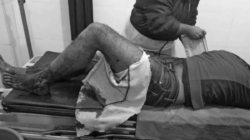Nepal introduced machine-readable passports in 2010, replacing the older handwritten versions, but the journey to modernize its passport system has been fraught with controversies and delays.
The controversy started during the procurement process in 2009-10, leading to a re-tendering of the contract. Since then, the French company, Oberthur Technologies (which later merged with Safran Identity and Security to form IDEMIA), has been the main supplier of machine-readable passports for Nepal.
In alignment with International Civil Aviation Organization (ICAO) guidelines, Nepal decided to upgrade to e-passports, launching the new biometric passports in November 2021. Notably, historian Satya Mohan Joshi was the first person to receive an e-passport on November 17, 2021. However, the path to this new system wasn’t smooth. The tender process for procuring the e-passport system had to be canceled three times between 2019 and 2021. Eventually, IDEMIA won the contract for the e-passport system as well.
To prevent supply disruptions during the transition, the government allowed IDEMIA to continue printing machine-readable passports under a “verification” process. According to a foreign ministry official, this decision was made to avoid public unrest. By the end of 2020, IDEMIA had printed over five million passports.
In late November 2024, the Department of Passports issued a new global tender for an additional five million passports, dividing the procurement into two packages. The delay of nearly a year in issuing the tender raised concerns that the government might once again allow IDEMIA to print additional passports under the existing agreement to meet growing demand.
The new contract carries a budget of around NPR 12 billion, with the winning bidder expected to deliver five million passports. Complaints about the tender process, including allegations of favoritism and unfair conditions, have surfaced from various international bidders.
On December 17, 2021, Augentic GmbH, a Germany-based company, accused the Department of Passports of tailoring the tender to favor one company. They criticized mandatory clauses in the tender document, such as restrictions on joint ventures, as conditions that would limit competition and unfairly benefit one supplier. Other companies, such as CETIS from Slovenia and E7 Security from the UAE, also expressed dissatisfaction with the process and requested amendments to the bidding conditions.
In response, Tirtha Aryal, Director General of the Department of Passports, denied the allegations, emphasizing that the process was transparent and in line with the procurement standards set by the World Bank and Asian Development Bank. He also assured that no company had been unfairly favored and that any company dissatisfied with the process could file complaints.
Foreign Minister Arzu Rana Deuba and Foreign Secretary Amrit Rai have expressed their awareness of the complaints and instructed the department to ensure fairness in the procurement process while maintaining an uninterrupted supply of passports.
Despite the complaints, Aryal argued that IDEMIA may have an advantage due to its long-standing experience printing Nepali passports, but the key concern is whether the new passports meet ICAO’s security standards.
Former Deputy Prime Minister Narayan Kaji Shrestha blamed delays on the inaction of former Foreign Minister NP Saud, claiming that Saud’s failure to sign key documents delayed the procurement process for months.
The controversy surrounding the procurement process continues to fuel debate, with some critics pointing to possible financial motives behind the repeated delays and disputes over passport procurement.




